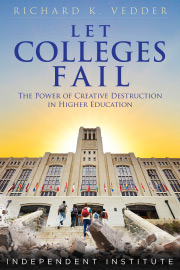How is this year’s election going to affect American higher education? I am an economist, and our tribe is somewhere between mediocre to awful at forecasting, but since I am tenured, retired, and unpaid by Minding the Campus, there are utterly no adverse consequences from making a fool of myself with this current assessment.
American universities, both so-called private ones and state universities, are clearly wards of the state and highly dependent on governments for funding. The mostly left-of-center campus populations contribute significantly to the Democratic Party with money and ideas and staff key governmental positions. Kamala Harris’s Dad taught at Stanford. It is no wonder that polls show that Republicans are increasingly skeptical about supporting higher education.
I assign a 20 percent probability to the Democrats winning control of all three levels of federal power: the House, Senate, and Presidency. Despite some current polling, post-convention Democratic momentum, and Republican political missteps, I assign a 20 percent probability to the Republicans taking total control. I think when the Republicans start hammering on such issues as weakened border security—excessive illegal immigration—high inflation, the botched exit from Afghanistan, etc., the early Harris surge arising out of the September 10 debate might dissipate. Still, I think the most likely outcome—60 percent probability—is for a divided government. Even if Harris wins, I think there is a high possibility of a Republican controlled Senate.
If the left takes total control, expect increased collegiate funding for various teaching and research activities. Expect efforts to enact free college and student loan forgiveness. Expect even stronger Department of Education fatwas to be issued governing college behavior on everything from alleged sexual misconduct to supporting a pro “diversity, equity, and inclusion” (DEI) race conscious curriculum and putting limits on punishing campus political protesters. As already stated by Chuck Schumer, expect far-reaching leftist agenda items to be fulfilled, such as ending Senate filibusters, initiating making D.C. a state, and more aggressive harassment of the Supreme Court—potentially threatening a constitutional crisis.
If the right takes total control, expect decreased federal higher education activism. Expect a Secretary of Education to be more like Betsy DeVos rather than Miguel Cardona, and probably even an attempt to abolish the Education Department. Expect bigger defense budgets, forcing belt-tightening in other areas, including higher education. See an end to Biden-era federal programs to drop money out of airplanes, or the equivalent, over campuses.
But it is more likely we will have governmental stasis—a lot of verbal warfare and nastiness—more of the same. Reluctantly, much more attention will finally occur on ending the outrageous fiscal irresponsibility of the government. However, neither Kamala Harris nor Donald Trump has shown the slightest interest in balancing budgets. But likely further lowering of our debt rating with an accompanying decline in global acceptance of the dollar as the world’s leading currency, along with cries about the necessity of reducing Social Security benefits within a decade, might galvanize Washington into a modicum of adult behavior. If so, that will probably make higher ed a target for budget cutting.
The left’s objective of imposing substantial tax hikes on high-income Americans could have unintended repercussions. A decline in student applications to expensive elite schools and a reduction in endowment values and income are possible outcomes. Moreover, such tax increases could dampen U.S. economic growth, making it more challenging to fund non-essential government functions. This could lead to prioritizing payments to the unemployed over government-funded college aid to middle-class Americans.
Much public policy regarding higher education is determined at the state level, and some changes in political leadership can be expected. In reaction to increasing collegiate leftist ideological fervor on campus, many states have restricted DEI programs. Another development in some states has been the formation of largely independent academic centers espousing traditional values on state university campuses. Those programs might grow even more with increased Republican state government control or languish if Democrats are big winners in state-level elections this fall.
Whoever wins, higher education will have to face the consequences of several long-run trends. To mention just two: integrity and honesty have generally been a hallmark of our universities, but increasing scandals about fraudulent scientific findings and academic plagiarism are hurting the academy. The birth dearth likely means smaller freshmen classes in coming years—and the birth rate is still falling. Will we open the doors more to foreign students to offset this? Stay tuned.













